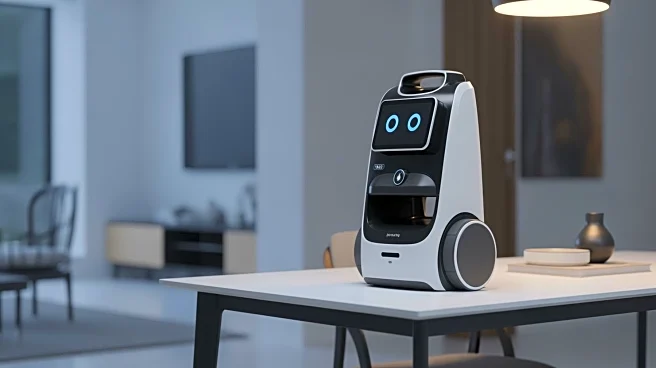What's Happening?
1X, a California-based company, has introduced Neo, a humanoid robot designed to perform household chores such as folding laundry, vacuuming, and bringing in groceries. Priced at $20,000, Neo is marketed
as a 'consumer-ready humanoid' and is available for preorder with a $200 deposit. Unlike other humanoids focused on industrial applications, Neo is intended for home use. The robot uses a combination of visual, audio, and contextual intelligence to interact with its environment, raising privacy concerns as it can see, hear, and remember user interactions. Neo's current functionality relies heavily on teleoperation, with plans for more autonomous capabilities by 2026.
Why It's Important?
The introduction of Neo represents a significant step in the development of consumer robotics, potentially transforming household management. However, the robot's reliance on data collection and teleoperation raises privacy and security concerns. Consumers must weigh the benefits of automation against the potential risks of having an AI-equipped device in their homes. The success of Neo could influence the future of home robotics, impacting industries related to AI, privacy, and consumer electronics. Early adopters will play a crucial role in shaping the robot's development and addressing privacy issues.
What's Next?
1X plans to enhance Neo's autonomous capabilities by 2026, with a broader international rollout expected in 2027. The company offers a $499 monthly subscription as an alternative to the full purchase price, although details on this option are pending. As Neo evolves, consumer feedback will be vital in refining its features and addressing privacy concerns. The development of home robotics will likely prompt discussions among policymakers, privacy advocates, and tech companies about the ethical implications of AI in domestic settings.
Beyond the Headlines
The deployment of Neo highlights the ethical and cultural challenges of integrating AI into daily life. As robots become more common in homes, society must consider the implications of machine learning and data privacy. The balance between convenience and security will be a critical factor in consumer acceptance. Additionally, the evolution of home robotics may influence labor markets, as automation could reduce the demand for certain household services.









